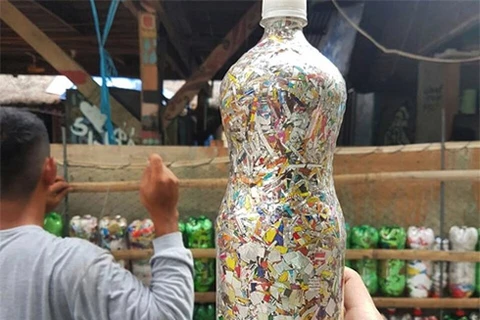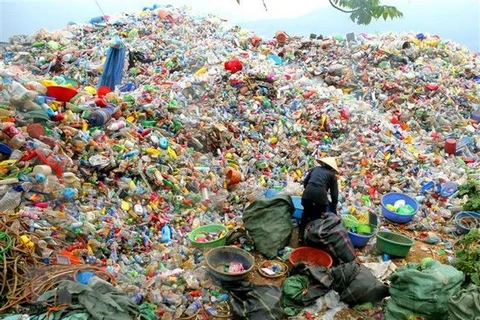Hanoi (VNA) – A group of young people from Hanoi have been travelling around the country, exchanging books for plastic waste to make eco-bricks, as they want to join the global efforts to reduce plastic waste.
The young volunteers call themselves the Green and Book Ambassadors (GBAs).
Established in 2012, the GBA has grown by dozens of members from around the country and even abroad, sharing their dedication for environmental protection and hoping to inspire others to do the same.
“Over the past six years, the GBAs have travelled extensively across Vietnam, particularly to disadvantaged and coastal areas to collect rubbish and provide books to needy students,” GBA co-founder Pham Thi Phuong Thuy, 26, told the Vietnam News Agency.
“More and more young people want to join in and offer financial support and ideas for the group to expand its coverage and activities,” she said, noting that most of them come from the green energy sector, and many are foreign tourists.
Wherever the GBAs go, they exchange books for plastic trash and teach children how to make eco-bricks with bottles and plastic bags.
“We use the bottles and plastic bags to make eco-bricks. Anyone can do it,” Thuy said, adding making eco-bricks are a great global initiative to curb plastic waste.
Claire Allured, a freelance British artist living in Hanoi, serving as the GBA’s art consultant, expressed her interest in the eco-brick making project given its environmental and creative values.
“I really enjoy functional art. You turn something being thrown away into something else which can be useful,” Allured said.
She expressed her hope to be able to get more involved with the project so she can provide more ideas, making more creative pieces out of people’s leftover waste.
EcoBricks come to Vietnam
The GBA project is part of efforts made by young Vietnamese nationwide to reduce plastic waste in the context of waste pollution becoming an urgent global issue.
Roughly 8 million tonnes of plastic waste are dumped into the ocean each year, and Vietnam is listed among the top five source nations.
According to international studies, it takes up to 100 years for plastic bags to decompose. The figure is over 400 years for plastic bottles. By 2050, the ocean will have more waste than fish if action is not take soon.
EcoBricks represent a different approach to waste management. The initiative turns plastic waste into a highly insulating, robust, affordable, building material, which simultaneously tackles problems of unemployment, waste and lack of housing. They can be used vertically as infill in timber-frame building systems, or horizontally, where they are mortared together with clay or cement.
The story of EcoBricks started in Guatemala, and, via the Philippines, goes to South Africa, and became an inspiration to other places around the world.
There are now 38 EcoBrick schools in Guatemala, with many more planned.
Making ecobricks is becoming more popular in the Philippines, which was rated as the world’s third biggest source of plastic pollution in the ocean, according to a report by Ocean Conservancy and the McKensey Centre for Business and Environment in November 2015.
In the northern Philippines, as part of the curriculum, students are asked to bring in a completed EcoBrick each week, having written their homework on the side of it.
In Vietnam, environmental protection, including eco-brick making groups founded by Vietnamese young people have bloomed in recent years, particularly in big cities.
Taking advantage of the global initiative, the GBA group expanded their activities nationwide since 2016.
However, as a newly-founded group, they faced many challenges in calling for the community’s participation from the outset.
In fact, most of other groups face similar difficulties while implementing environmental protection ideas due to a lack of connectivity.
To cope with the situation, many environmental protection organisations have organised seminars and meetings to link these groups. Through these activities, those active in the field have the opportunity to share their experience and spread inspiration, helping to promote environmental protection acts. –VNA
VNA




























